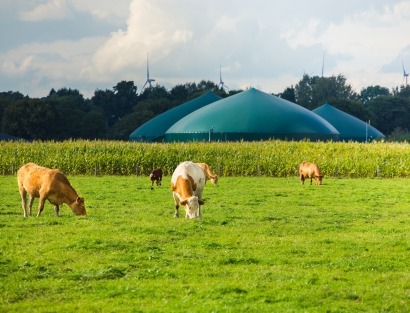
The use of this renewable gas, instead of fossil fuels, will result in the reuse of 10 million tons of waste per year and will prevent the emission of 728,000 tons of CO2 per year, equivalent to planting 8.7 million trees.
As part of this objective, the energy company has agreed to a partnership with Kira Ventures, a leading Spanish company in renewable energy asset promotion and management, for the start-up of up to 15 biomethane plants in Spain during this decade. Both companies are now working on the development of the first five, which will be located in Castilla-La Mancha and Castilla y León, and are expected to be operational between 2025 and 2026.
These plants will use agricultural and livestock waste from the areas where they are installed, such as manure and slurry, among others, and will be 100% sustainable, since they will use renewable electricity and the heat generated by the biogas itself.
Javier Antúnez, Cepsa’s Biofuels Manager, noted: "We continue to focus on second-generation biofuels by developing biomethane plants. This is a further step in Cepsa's strategy to decarbonize its operations and continue driving the energy transition. By producing biomethane, we will be able to replace natural gas in industrial processes and thus advance our goal of reducing emissions from our activity by 55%, as well as contribute to the production of green hydrogen and offer a new sustainable mobility alternative."
Alberto Rodríguez Gallego, partner at Kira Ventures, highlighted: "With this agreement, we have consolidated our commitment to the development of new renewable energy vectors, contributing to the decarbonization of industry. At Kira we believe that biomethane will play a key role in the transition to a carbon neutral economy, improving our country's energy independence and providing a more efficient alternative to manage livestock and agri-food waste. Spain is ready to take advantage of its potential in the expansion of this technology and Kira Ventures aspires to play a relevant role in this transition.”
This milestone is part of Cepsa's 2030 “Positive Motion” strategy, in which the company is promoting the decarbonization of its activity and that of its customers, in particular through the production of green molecules (biofuels and green hydrogen). The company has an ambitious roadmap in place to cut its CO2 emissions by 55% by 2030 (Scope 1 and 2) compared to 2019 and aims to be carbon neutral by 2050, which will require the use of biomethane in its industrial processes. As for the carbon intensity of its sold energy it will be between 15 and 20% lower by 2030.
Biomethane has the same characteristics as natural gas, but allows up to 100% reduction of CO2 emissions. This similarity means that it can also be stored or injected directly into the existing gas transmission network, without developing new infrastructure. In addition to being used as a substitute for natural gas in industrial use, this renewable gas can also be used to produce green hydrogen and as an alternative for sustainable mobility.
This second-generation (2G) biofuel is obtained from biogas, which in turn is produced through a natural decomposition process (anaerobic digestion) of biodegradable organic agricultural, livestock, and industrial waste. Subsequently, after purification through a technological process called upgrading, it is converted into biomethane.
Biomethane plants are a sustainable alternative to waste treatment, as they allow waste to be reused to produce renewable energy and produce by-products such as compost or sustainable fertilizers that can be used on local farmland. In addition, biomethane production plants contribute to the sustainable economic development of the rural world and the depopulated regions of Spain, boosting two key sectors for the Spanish economy: agriculture and livestock.
The production of renewable gases is in line with the REPowerEU initiative to reduce dependence on fossil fuels and CO2 emissions, as well as contribute to several of the Sustainable Development Goals of the 2030 Agenda: SDG 7 (Affordable and clean energy), SDG 8 (Decent work and economic growth), SDG 12 (Responsible consumption and production), and SDG 13 (Climate action).

